Challenge The Status Quo: Why We Can't Be Mindless With Jeff Gothelf
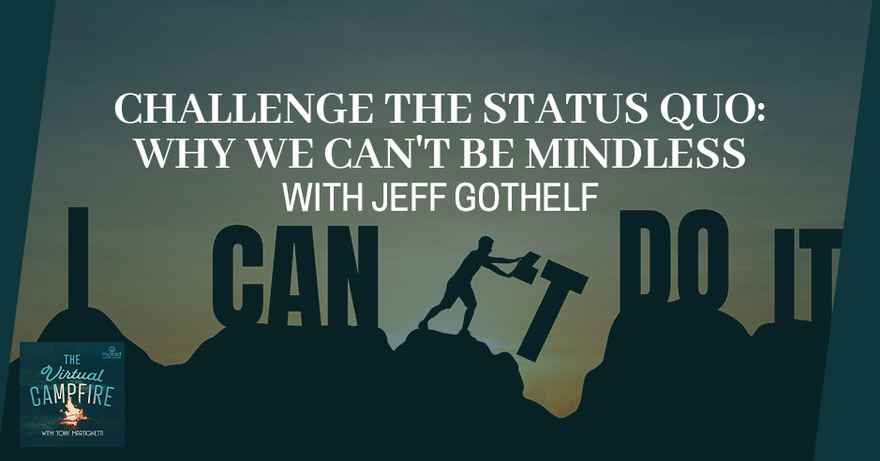
Our experience with the pandemic should inspire us to challenge the status quo. We don't have the luxury to be mindless today. We have to find a better way to do things. Tony Martignetti's guest in this episode is Jeff Gothelf, the co-author of the award-winning book "Lean UX." Jeff shares with Tony his life journey from wanting to become a rock star to becoming a sought-after teacher and entrepreneur. Join in the conversation to learn how to think outside the box. Look at the world more critically rather than accepting something because "that's just the way it is." Tune in and tap into endless possibilities!
---
Listen to the podcast here:
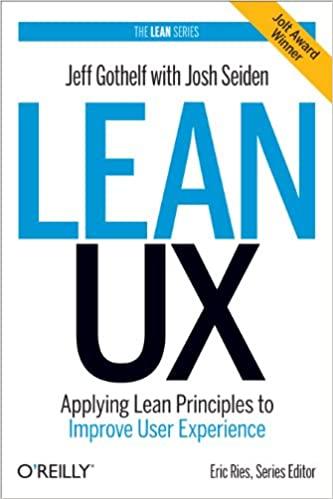 It is my honor to introduce you to my guest, Jeff Gothelf. Jeff helps organizations build better products and help executives build cultures that build better products. He's the co-author of the award-winning book Lean UX and the Harvard Business Review Press book, Sense and Respond. Starting off as a Software Designer, Jeff now works as a coaching consultant and keynote speaker, helping companies bridge the gaps between business, agility, digital transformation, product management and human-centered design.
It is my honor to introduce you to my guest, Jeff Gothelf. Jeff helps organizations build better products and help executives build cultures that build better products. He's the co-author of the award-winning book Lean UX and the Harvard Business Review Press book, Sense and Respond. Starting off as a Software Designer, Jeff now works as a coaching consultant and keynote speaker, helping companies bridge the gaps between business, agility, digital transformation, product management and human-centered design.
Jeff Cofounded Sense & Respond Press, the publishing house for practical business books for busy executives. His book, Forever Employable, was published in June of 2020. It’s perfect timing and a great book. He lives in Barcelona, Spain, with his wife and two daughters. Jeff, I want to welcome you to the show.
Tony, thanks so much for having me. That was a nice intro.
Thank you so much. It's easy when you are as accomplished as you are, and you are doing such amazing work in the world. I'm honored to have you and to share your story about how you’ve got to where you are in the world now.
I can't wait to share it. I'm looking forward to telling you some stories. I like telling stories. That's going to work out flying.
I love that you are in one of my favorite cities, Barcelona. It's such a beautiful place. I'm a big fan of architecture. I keep on thinking of my favorite architect, Gaudi.
It's a gorgeous city. In fact, it never ceases to amaze me. I was out on a bike ride on the more suburban side of the city. It's still amazing how many old buildings exist among the new high rises and the new developments. It never ceases to surprise me how beautiful this is.
Sometimes you’ve got to get out and experience more in places. It's great that you made this move. I can't wait to hear what prompted the move. We will talk more about that as we dive in. Let me explain to you the way we do this. We will tell your story through what's called flashpoints. These are points in your story that have ignited your gifts into the world. Along the way, we will pause and see what themes are showing up. Share what you are called to share. With that, I will pass it to you, Jeff. You can take it away.
It's interesting. Growing up, I always thought, “I wanted to be a rock star.” That's all I wanted to be. It's hard to become a rockstar. I played piano. I didn’t play guitar. It had to be a certain kind of rock. I ended up playing music a lot. My dad played piano. Growing up, there’s always music in the house. We learned how to play piano as kids. I went to college. I played in bands in high school. I didn't get into it until college. When I graduated from university, I would finally found a group of people that I enjoyed playing music with. We felt like we had something that could potentially be something a bit more.
We spent all of our time doing that. There was a real drive to maintain that. What was interesting is that we were a year apart. Half of the band was a year older than the other half of the band. I was in the older half of the band. We graduated. Half of the band had not yet graduated. We went to school at James Madison University in Harrisonburg, Virginia, which is a lovely place but you don't stick around after college in Harrisonburg.
Some people do, I suppose. Certainly, back then, many years ago, there wasn't a whole lot to do in Harrisonburg. I went somewhere else, Richmond, DC, Raleigh or Charlotte, that type of thing. We didn't know what to do. The band was going to break up because some of us graduated. We ended up in the summer in between, waiting to decide what to do next. I had a very strange opportunity come my way. I was graduating. It was the last week of the last semester of my senior year. I’ve got a call from the school and they said, “Jeff, we know you don't have a job when school ends yet. Do you want to join the circus?”
You need to have the self-confidence to know you could figure things out.
I said, “What?” They said, “Yes.” The circus is a circus called the Clyde Beatty Cole Brothers Circus coming through town. They are passing through. The bandleader is an alumnus of James Madison University. They need a sound and lighting technician to join them. My degree was in Media Production. That was what I had gotten a degree in. The school was going to get their job placement numbers to tick up a little bit higher if I would accept this position.
I took a call with the bandleader. He called me from the road. I asked him a little bit about the gig. He explained to me what I had to do, what it paid and where do I live. I called my parents. To my surprise, they said, “You should do this.” I said, “Really?” They said, “Yes.” I said, “Yes.” I graduated on Saturday. On Sunday, I put all my stuff in storage. All my stuff in 1995 consisted of a mattress, my motorcycle, and my Bob Marley poster and that was about it.
Monday, I was in the circus. I spent the entire summer in between the year that we graduated. The rest of the band was thinking about what was going to happen next on the road, touring with the Clyde Beatty Cole Brothers Circus. I spent six months on the road, saw the circus every day, twice a day, three times on Saturdays. I saw the same show 400 times in a row that summer. It was a crazy experience. I discovered a ton about myself. I learned a ton about a whole subculture that very few people are aware of that exists in this world, in the US, especially. It's this weird 200-person subculture that weaves in and out of the worlds that we live in.
I earned money for the first time. Considering I have never met anybody before in my life, nothing significant, it paid real money and I’ve got to save it all. That was the summer of ‘95. It’s going to wrap up the band thing as I was coming back. It's a circus that follows Interstate 95 on the East Coast of the United States. It starts in Florida, where all circuses are based. It's a true story. Perhaps not surprisingly, I don't know. The circus follows the warm weather throughout a nine-month season. They start in February in Florida, go nine months up, and get back to Florida around Thanksgiving.
I’ve got on in Virginia on the way up and all the way up to Maine. As it was passing through Virginia on the way back down, I called up the guys in the band and I said, “We are passing through. I could keep going to Florida and figure this out if I’ve got a circus career ahead of me or I could get off, and we could try to be rockstars.” They said, “You should get off. Come back.” I’ve got off back in Virginia, rejoined the guys and we kept at it for a few more years after that.
I can't help but think about the whole story about running off and joining the circus. It's like the classic story. Also, thinking about all the lessons you have taken away from it, it's amazing. Most people would never even imagine what it looks like to be inside of a circus, also seeing what it takes to set up a circus and then assemble it, take it down, reassemble it, day in, day out and the show must go on. You continued to do that, day in and day out. I think about that and how that applies to running a business.
The most important thing I learned in that experience was self-confidence. It was the self-confidence to know that I could figure things out. It was a weird place. You get there and nobody goes by their real name, first of all. I'm hanging out with guys named Slick, Fly, Toro and Guff, all these weird names. I was like, “Why does nobody use their real name?” He said, “It’s because everybody in their first few days in the circus messes up somehow, makes a mistake and whatever they do, they earn a nickname from that mistake. You live with that name for the entirety of your circus career. I will give you an example. Toro was named Toro because he snored like a bull.
You could hear him across the entire circus ground at night. For example, there was a guy who started his first week and got food poisoning. He was forever known as Hurl. For better or worse, he was Hurl. I don't know his real name. They don’t know anybody's real name. If you are curious, my nickname was Cylon. It was 1995 Battlestar Galactica is still very heavy in the minds of a lot of people back then. The PA system that I had to run for the circus tent was grossly underpowered. It was way too small.
Every time the ringmaster would step in front of the speakers during a performance in my first week, he would get some feedback because I couldn't figure out how to get the system to sound right. The feedback sounded like the noise that the Cylons made. From that moment on, I was the Cylon, and no one knew my real name. You get there. You don't know anything. You don't know how anything works. You don't know anybody's real name.
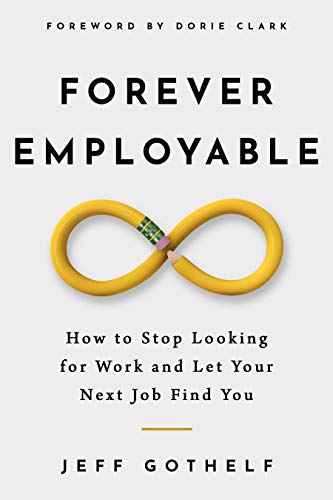 You are supposed to hit the ground running. That was the scariest part. I told you I joined on Monday and there were two shows to do on Monday. They said, “Here's your PA, the speakers and the run of the show. Good luck.” I learned to swim in the deep end, many things, self-sufficiency. This ability to say, “I can do this. I can figure it out.”
You are supposed to hit the ground running. That was the scariest part. I told you I joined on Monday and there were two shows to do on Monday. They said, “Here's your PA, the speakers and the run of the show. Good luck.” I learned to swim in the deep end, many things, self-sufficiency. This ability to say, “I can do this. I can figure it out.”
I will give you another example. I came to the circus with a small toolkit. Stuff broke all the time. The road is unkind to audio equipment and things like that. I learned how to solder things. I know how to fix microphones and cables while the show was happening. You figure this out. You learn how to survive in the subculture. You learn how to build alliances and make friends. To me, that taught me that no matter where I found myself, I could figure it out. That was huge for me.
I can see these lessons being like things that you are going to take with you as you move forward. Now I'm dying to find out what happens next. You leave the circus. You come back and are going to be with your buddies in the band. Obviously, you didn't stay in the band. Otherwise, we will be seeing you on rock T-shirts or what have you. What happened next?
We gave it a real shot. We did. It's tough. You put in the work. You learn the ropes. This is 1995. Netscape launched in 1995, the first visual browser. There's no real internet to advertise on yet, but it's coming around. I'm managing the band. I'm playing in the band, trying to live, maintaining crappy day jobs. We maintain this for a few more years until, in 1999, I’ve got tired of being broke. I was living on $400 a month roughly at the time.
That sucked. I didn't like that. It's interesting. When I was in the band, we were going on tour all the time and certainly every weekend. We were based out of Richmond, Virginia. There was no time to socialize or meet girls, go on dates, and that type of thing. As the band was starting to wind down, I started wanting to have a social life. I was meeting women. I wanted to go on dates. I had no money. I had to figure it out.
I had started building websites in the early internet for my band, other bands and that type of thing. I taught myself how to do that, and then the dot-com boom comes around. In 1999 and 2000, if you could spell HTML, which was the building block of the internet and web 1.0, you could get a job. I could do a little bit more. You would build websites and do some basic graphic design. I’ve got my first real job doing web design for one of the big web consulting companies that came out of the dot-com boom.
That's what gave me the career direction that I was looking for as my rock star dreams were fading away. That set me off to pursue a web design and an interaction design career, which led to bigger, better jobs and leadership roles. As the web became more interactive and integrated into our lives, the complexity of the work became more interesting, the complexity of the teams that I was working with and leading became more challenging. It proved to be an interesting decade. I spent about a decade that I talked through very briefly of learning a career because there was no cost. There was no internet. We had green screen terminals at best. We are learning a new trade basically in the field.
It's great to be part of something. When at first getting off the ground, especially because there were no degrees or things that you can latch onto before then but it is amazing when you think about it. Here's a little small thing you were doing and creating HTML websites, graphic design elements and that mushroomed into a massive career because you happened to be at the right place at the right time. You had a desire and a need to create something for yourself, money, a better life for yourself. That launched a career for you that was quite successful, decade long, the right time in that industry is powerful. Did you ever feel you lack for something in that period or you continued to figure it out as you moved along?
There's always an opportunity to make things better.
There was always an opportunity to make things better. There's always an opportunity to consider where I am going to take this from here. There was definitely a bit of that vibe that I was winging it. It was a bit like walking through a fog. I could see the next step, maybe 2, 5, 10 steps ahead. If you would have asked me, “I had no idea where I was going to end up.” You think about walking through a fog. You take those next two steps, and the next two steps become clear or an obstacle becomes obvious, and then you’ve got to take a left, right, go backward or whatever it is.
I feel like people tend to dismiss these pre-career experiences as that was some fun stuff you did before you realized that you needed to be an adult but I don't see it that way. In the circus, I learned other than a tremendous amount of self-confidence, as I mentioned to you before. When I played with my band, I learned about entrepreneurialism and running a business because bands are startups. It's you and your friends get together. You have this crazy idea. You think it's going to change the world. Nobody believes in you. You are broke. You pour everything you have into it, trying to build a viable business that people love out of this thing.
You take all of those qualities and when you bring them into a professional career, even if you can't see 4, 5, 6 steps ahead, there is this, "Figure it out." That's a scrappy entrepreneurial attitude to make sure that it comes together. To me, that was extremely valuable as I was moving up through the ranks in the first ten years of my official career moving out.
This is something that so many people don't quite see. They discount their experiences. You have to embrace every experience you have. The more experiences you have in different areas, there are opportunities to uncover more aspects of who you are. You take them all. You integrate them. It’s this concept of like you transcend and include. You include those past experiences and use them to transcend to that next level and see what else uncovers.
In some ways, it's great not to know exactly where you are headed. In some ways, it helps you to be open to what might be possible. The old adage of like, “You are only always showing the tip of the iceberg.” There's a whole iceberg underneath that is waiting to be uncovered, which to most people might think like, “That's scary.” It's quite powerful because even you don't know what that iceberg looks like.
There is that openness to it. We grow up, and we are taught that there is a way to do things correctly when it comes to your career. You get that first job. You work for a while. You gain expertise, and then you get a promotion or make a move to another company where you get a little bit more money, maybe a little bit more responsibility, a slightly better title. You keep making these hops and that's how your career progresses.
If we buy into that, especially if you have chosen a very specific path like lawyer, accountant, project manager or something like that, it's very easy to get locked into the prescribed path. When these opportunities come up that may pull us away from that path, we tend to dismiss them. We are not open to them because I know exactly the 15, 20-year career plan for a lawyer, an accountant or a project manager and this isn't on that list, so I'm not going to do it.
That is something that a lot of people, especially sadly, particularly during the last couple of years, are coming to realize doesn't make sense anymore. Frankly, it's the reason I wrote Forever Employable. It was to get people thinking more creatively about how to take all of their experiences. Everything that they know and have done creates a situation that actively generates those opportunities that allow them to have options. It gives them a choice.
You can still reject all of these off-track opportunities and maintain the path if you want but at the very least, you have options. If that path gets cut off for whatever reason, there's a constant stream of inbound options. That's terrifying because I can't see the rest of the iceberg. I can't see the next five steps in the path for a lot of folks but at least you have options.
I love that you say this because this is exactly the thing that people need to hear is that there's a path but there's not just one path. There are multiple paths. Don't be afraid to take a couple of detours and then coming back. You can always get back to a path that was prescribed. You will learn a lot along with those detours and different pivots you have along the way. You said something earlier about how being in a band is being in a startup. I always connect to the fact that we are all startups.
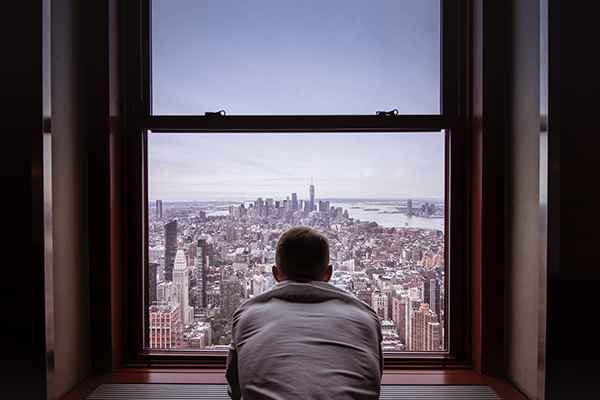
I remember the book that has had an impact on me, which is the startup of you by the founders of LinkedIn. I love that book because it connects the idea that you have to treat your life like a startup. Don't be afraid to take risks because that's how you grow. Don't be afraid to pivot your business because sometimes you have to meet the customer demand. Think about where you are going to next because your industry is always changing. It's an interesting idea.
It's sad. It's frankly like how few people see their career that way. They don't. They see this, “I'm a sales track. That's the track that I'm on. They don't treat it with the investment that you would treat a startup. A lot of people are on autopilot. You learn so much simply by talking to people. When Forever Employable first came out, I started talking to groups about the book. We would talk about the various steps in the book.
The first step in the book is to choose your passion. You should plant your flag is what I call the thing that you care about the most. Where do you want to be known for? I went into writing the book and talking to these folks after the book came out with a big assumption that I made was that everybody knew where they wanted to plant their flag. Everybody knew what they were passionate about. Everybody had things that they loved and would be ready to dedicate their lives to. I was totally wrong.
There are a lot of people who don't know what their passion is, who don't know where they would plant a flag now or what they would want to be known for. Part of the root cause of that is this thing that's like, grow up, go to college, get a job, whatever it is, and don't even think about it. Especially in this increasingly post-pandemic world, we don't have that luxury for that mindlessness of being like, “I will follow the old career path.” We don't have that luxury anymore.
You learn so much by talking to people.
It's time for us to challenge that. The old paradigm is no longer even possible because we've got to start thinking about the precious life that we are holding onto. It's a precious life. We need to treat it like something that it's a gift and we can use it the way we want. I want to get back into your story because although, this book is amazing and I want to get more into that. I want to get back into what brought you into the space. You made quite a shift from being in the tech world to then leaving the tech world and starting your own thing. Tell me what prompted your journey from being in the tech world and your own business.
I spent ten years in web design following the path, a little bit more money, responsibility, leading teams. Ten years into my career, I found myself in a situation leading a team in New York City that was struggling with the particular challenge of designing and developing modern websites and software. The challenge was, how do we work better together with modern tools? That’s the easiest way to share it. It turned out that this very specific challenge was not unique to our team. I would argue almost every other team in the world that was building software or websites of any kind was struggling with this.
Nobody had a good answer for it. I was lucky to be in a situation where my boss allowed us to experiment with different ways to try to solve this particular collaboration issue between software developers, designers and product managers. We found a solution to it. In doing so, I started sharing our work, the work that we were doing together to solve this particular problem initially in blog posts, presentations, at conferences. Eventually, it turned into a book, my first book. That book was called Lean UX.
Since there were no other answers to this problem, that book became the answer to this problem. I won’t make the assertion that it's the only way to solve these types of collaboration issues but this was what worked for us. We wrote about it in the book. We shared it and the book became massively successful for a tech book, a niche book written by designers for designers and other techies. It's sold over 100,000 copies. In fact, the third edition, which is crazy, of Lean UX will come out soon.
I rewrote it. The first edition came out in 2013. It continues to sell. What's fascinating is that book changed my life because very quickly, with the success of that book, the book started to take off what people were asking me to do changed. While I was still employed full-time, people started coming in and saying, “Jeff, can you come to my company and give us a talk about Lean UX about how you guys did this? Jeff, can you come to teach us how to do this? Can you teach a workshop at this conference? Can you come to talk to my bosses about this?”
All of a sudden, there's an inbound stream of opportunities that I'm attracting to myself. That was a clear indication that there were a lot more here than my 9:00 to 5:00 job. Around the same time, the two other entrepreneurial folks who I had met in New York City said, “Let's start our own business together.” We started an agency in New York City called Proof, which we very quickly sold to a slightly larger agency called Neo. We became the New York City office of Neo, which was again a digital product studio.
What was interesting was I was using my newfound tech world celebrity as the marketing for that business. I was not even doing that much design or product development work but doing more content marketing work, education work, and building a business right around this that was also generating leads for our other business.
After four years of doing that, we sold that business and I ventured out on my own. Since 2015, I have been self-employed and building this business. It's a global business, which has allowed me to challenge the status. I grew up in New Jersey. We were living in New Jersey. I was working in New York City but it got to a point where I wasn't working anywhere particularly. I was working wherever the work was and that was all over the world.
My wife and I had to challenge the status quo and say, “Where do we want to live? We don't have to live here. This is a real opportunity." That's the short version. I can tell you the longer version as well. We ended up in Spain, which has been nice. The path has been to do the work, solve the problems, share the work for free, and then take advantage and monetize the inbound opportunities to change trajectory.
What you described is so powerful because it starts with a small thing. Not to belittle what it was. If you are sitting in an office and working on some project or idea, and the idea that you have could be the starting point of something big, you have to be willing not to hold onto it too tightly. You’ve got to let it go. If you love something, set it free and give it out to other people.
By sharing it, it becomes something bigger. It allows itself to take a life of its own that allows you to become something more than what you think you are limiting yourself to be. I look at your story and I think, “That's fascinating.” You could have said to yourself, “We have figured this thing out,” you and your team, and then held it to yourself. Instead, you decided to create a way to share it and look at what it had created.
The more you give away, the more comes back.
They are terrified to give away their trade secrets and expertise. I understand that. You have worked hard for that expertise. You have earned that experience, 15, 20, 25 years of work to get it. It's unintuitive and yet every single time, the more I give away, the more it comes back. This is the thing that drives me crazy in a good way. If you go to my website, one of the pages has videos of me giving keynotes at various conferences around the world. Keynotes that I'm particularly proud of and keynotes that I offer for sale. People can hire me to give those keynotes. You could as easily play that video in a conference room and have everybody sit around and it would cost you nothing.
People reach out weekly to say, “Jeff, I saw this video on your website. Can you come in and give that talk?” These days, it's remote. “Can you give that talk remotely?” It's unintuitive. It feels like you are giving away the firm and you are not. What you are doing is you are being generous to the community. You are creating a name for yourself. You are giving back to the people who helped you get to where you are now. When they need your expertise, you are the first name that pops up every single time. It works.

What we were saying earlier about the iceberg is when you realize that you are sharing but you are only sharing the tip of the iceberg. You don't even know what else you have to give. There are so many new ideas, things that will come out of you continuing to create and to be out there, and in contact with other people when you created your book. You realized that there were people when they collide with your book, and you discover things from them that then become new ideas you want to play with. It's a co-creation process, which is a beautiful thing that helps you uncover more of the iceberg.
I will put ideas out into the world, sometimes I will put templates, canvases or frameworks and it comes back to me with other people building on top of it. To me, it's like, “That's amazing.” I don't feel any offense by that. I don't feel threatened by that. I'm so impressed that they took the thing that I made and made it better. It's not liked my value goes away. It has been made more valuable and I have learned something from them. It's tremendous but it's unintuitive. It's hard for people to do this. It's a formula that works.
We have covered a lot of ground and I feel like we have already dug into many different areas. I want to ask, as you look back on your journey to getting to where you are, what are some things that you have taken away about yourself that we haven't already covered that you want to share? What are some lessons you have learned that you want to share with people?
Two things that have dawned on me in the year that I spent writing Forever Employable and the year since then is that I didn't realize about myself until I was talking about this part of my career. One is if you had asked me several years ago, where I would be, I never would have said a teacher. That's what I do. I teach. Everything I do is some version of teaching, whether it's coaching, consulting or workshops, which are obviously teaching, giving a keynote or doing a podcast interview, it's teaching. That's exactly what I do, which is something that I would never have considered as a potential career for myself. I like it. I'm pretty good at it. That's a big surprise for me that I have learned.
The other thing, too, is this entrepreneurial spirit. I never saw myself as an entrepreneur. My father will tell you to this day that he's not an entrepreneur. He's not an ideas guy. He's an execution guy. I inherited that same belief about myself. I never saw myself as the ideas guy. If you have a good idea, I hope you execute it but get it done. Particularly in the last decade, I have discovered that entrepreneurial spirit in myself and I had it all along. I had it when I was a touring musician and when selling Jolly Ranchers for $0.25 a pop in elementary school. I have had it my whole life. I never realized it until I was pushed into exposing it. To me, that is fantastic. I'm a little sad that I didn't think I had it up until several years ago.
It’s a great insight because so many people don't understand the gifts that they have until they have taken time to reflect on it and see those things through a different lens, the lens of looking back and saying, “That's right. Those things were my gifts. They are the gifts that I can bring to my situation.” I have one more question to ask you. What are 1 or 2 books that have had an impact on you and why?
The book that I think back that changed how I see the world and it's going to be interesting is called, The Design of Everyday Things by Don Norman. Don Norman is a professor. He’s a legend in the design world. He worked at Apple. He invented this world of human-centered design and laid the foundation for it. A lot of the stuff underpins the products that we love to use these days like Apple products, Tesla, Netflix, those types of beautifully designed artifacts.
He coined the word affordances, and affordance is the thing that tells you intuitively what you can do with an object like a door handle for pushing or pulling. The Design of Everyday Things is a book that takes a common-sense designer's point of view is to have a world that’s designed. Why do we instinctively push this door but pull on that door? Why are teapots designed in a particular way? It's to ensure that the water comes out in a certain direction and we don't burn ourselves in the process with hot water.
If you have a good idea, execute it.
That book, first of all, pushed me in the direction of design as a whole, a fascinating career. What it also pushed me to do is look at the world more critically. Instead of accepting something as, “That's the way it is,” even though there's nowhere to pull on that door, I still have to pull on it. It’s the question, the challenge, the pushback and says, “This can be done better.” Let's think about these three steps downstream from here.
You’ve got it done but, is this the best it could be? How can it be better? Are we meeting the needs of the people that we made the thing for? That has defined everything that I do. I love that book. It's required reading for anybody going to design, at the very least. It's a life-changing book for most people, The Design of Everyday Things by Don Norman.
I’ve got my next book lined up now. I'm a huge fan of design and architecture design. Anything art-related has been on my list but that one connects with me. I love the fact that you have taken that nugget away. It's beautiful. I have to ask you one more question about your newest book, Forever Employable because it's such a fantastic book, especially for these times when people are questioning. What is one thing you want people to take away from it, maybe one quick insight that you want to share?

The thing that I would love for people to take away from it is that the traditional career path is too risky. I want you to reduce the risk in your career and your life. By examining everything you know, all the experience you have, and learning how to share it, you can build a safety net around that traditional career. If it does go sideways for whatever reason, you've got opportunities and options.
Jeff, I can't thank you enough for coming to this show, sharing your stories and insights. I love your passion. The way you have navigated her life has been a great example of how people can reframe the way that they are looking at their situation. That's the gift. Thank you.
It’s my pleasure, Tony. Thanks so much for having me. This was great.
Thank you. I want to make sure people know where to find you. What's the best place for people to reach out to you?
I'm super easy to find that as again, by design, JeffGothelf.com is probably the best place to go. Do feel free to connect with me on LinkedIn as well.
Thank you so much. Thank you to the readers for coming on the journey with us. I know you are taking away so many great insights. That's a wrap.
Important Links:
- Lean UX
- Sense and Respond
- Sense & Respond Press
- Forever Employable
- The Design of Everyday Things
- LinkedIn – Jeff Gothelf
About Jeff Gothelf
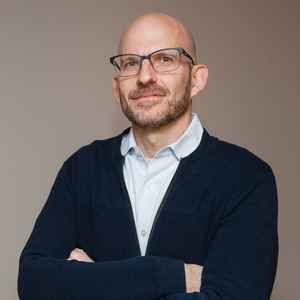 I believe humility and learning are in short supply. To improve that, I teach executives and teams -- through advising, workshops, keynotes, coaching & books -- to focus on their customers, learn from mistakes and create an agile culture that continuously improves their products and services and the way they work.
I believe humility and learning are in short supply. To improve that, I teach executives and teams -- through advising, workshops, keynotes, coaching & books -- to focus on their customers, learn from mistakes and create an agile culture that continuously improves their products and services and the way they work.
More recently I've codified the principles of modern product development and applied them to building a platform of thought leadership and recognized expertise. I capture this approach in my latest book, Forever Employable.
I'm excited to partner with executives and companies looking to improve not only their products but the culture that builds them. To learn more please reach out directly to me at jeff@gothelf.co.


0 comments
Leave a comment
Please log in or register to post a comment